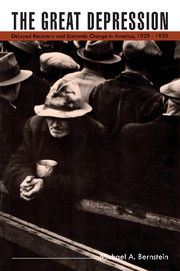Book contents
- Frontmatter
- Contents
- List of tables
- List of figures
- Editors' preface
- Preface
- Introduction: The puzzle of the 1930s
- 1 Long-term economic growth and the problem of recovery in the United States, 1929–39
- 2 The transformation of American industry in the interwar period
- 3 A reassessment of investment failure in the interwar economy
- 4 Technical change during the interwar years
- 5 The effective demand problem of the interwar period. I: Cyclical and structural unemployment
- 6 The effective demand problem of the interwar period. II: Cyclical and secular changes in final demand
- 7 New Deal economic policy and the problem of recovery
- 8 Contemporary economic problems in historical perspective
- Bibliography
- Index
7 - New Deal economic policy and the problem of recovery
Published online by Cambridge University Press: 06 July 2010
- Frontmatter
- Contents
- List of tables
- List of figures
- Editors' preface
- Preface
- Introduction: The puzzle of the 1930s
- 1 Long-term economic growth and the problem of recovery in the United States, 1929–39
- 2 The transformation of American industry in the interwar period
- 3 A reassessment of investment failure in the interwar economy
- 4 Technical change during the interwar years
- 5 The effective demand problem of the interwar period. I: Cyclical and structural unemployment
- 6 The effective demand problem of the interwar period. II: Cyclical and secular changes in final demand
- 7 New Deal economic policy and the problem of recovery
- 8 Contemporary economic problems in historical perspective
- Bibliography
- Index
Summary
Industry generally brings together a multitude of men in the same place and creates new and complex relations among them. These men are exposed to sudden great alterations of plenty and want, which threaten public peace. Work of this sort may endanger the health, even the life, of those who make money out of it or who are employed therein. Therefore the industrial classes, more than other classes, need rules, supervision, and restraint, and it naturally follows that the functions of government multiply as they multiply.
– Alexis de TocquevilleThe entire composite of New Deal policies must be considered if one is to assess the political economy of the 1930s. Following common practice, these policies can be divided into the following categories: (1) the measures of relief: the emergency banking bill, the Federal Emergency Relief Administration, the Civilian Conservation Corps, the Farm Credit Act to forestall farm foreclosures, Harry Hopkins's Civil Works Administration, and the first agricultural program for crop and livestock herd curtailment; (2) the measures of recovery: the National Recovery Administration (N.R.A.), Harold Ickes's Public Works Administration, the dollar devaluation and gold and silver purchase programs, the various housing acts, and the lending agencies, including and following the Reconstruction Finance Corporation taken over from the Hoover administration; and (3) the measures of reform: the Tennessee Valley Authority, the Social Security Act, the Securities and Exchange Commission, the Federal Communications Commission, the Rural Electrification Administration, the Banking Act of 1935 reforming the Federal Reserve System, and the Wagner bill setting up the National Labor Relations Board.
- Type
- Chapter
- Information
- The Great DepressionDelayed Recovery and Economic Change in America, 1929–1939, pp. 184 - 206Publisher: Cambridge University PressPrint publication year: 1987
- 1
- Cited by



